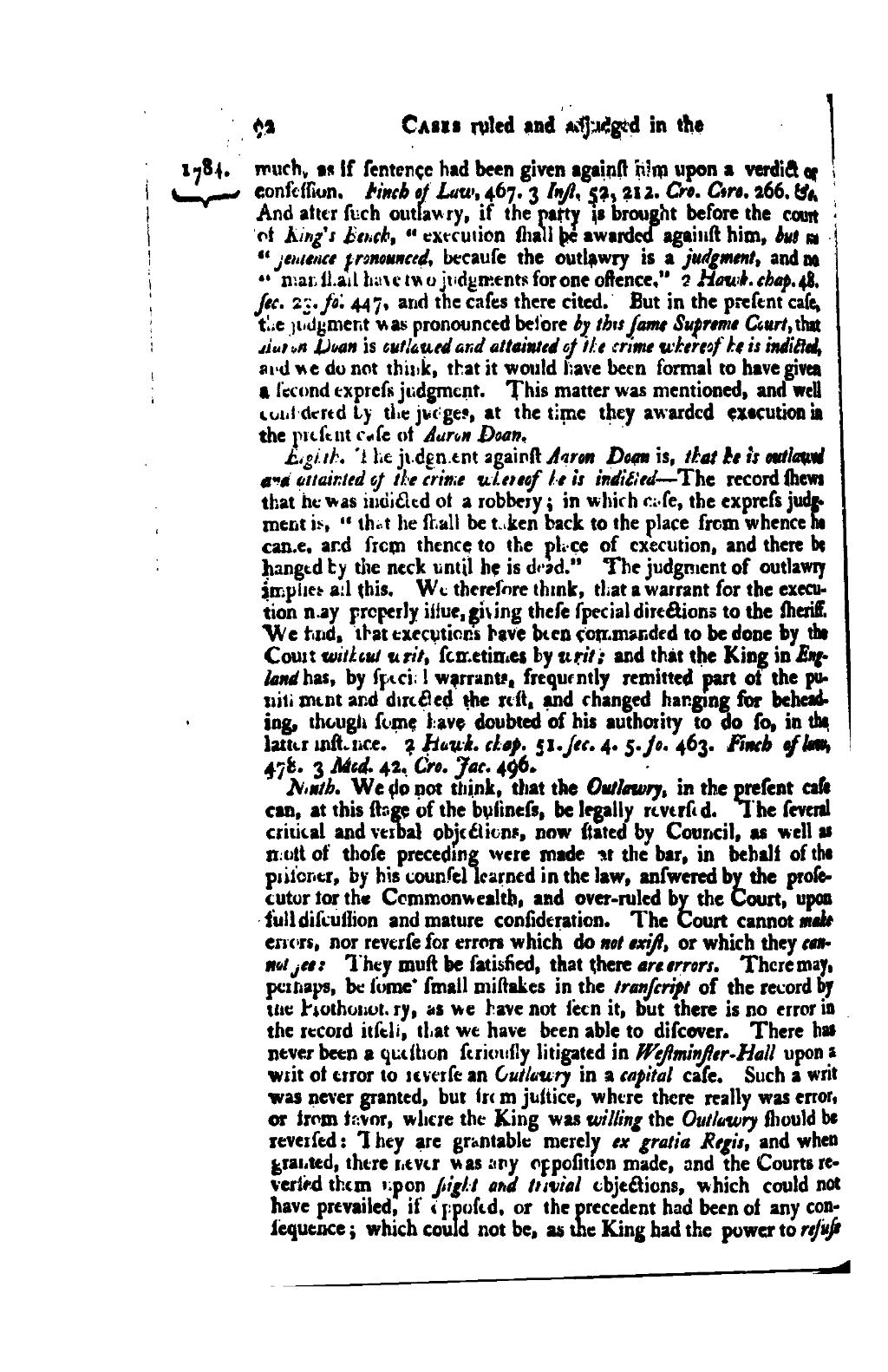1784.![]()
much, as if fentence had been given againft him upon a verdict or confeffion. Finch oƒ Law, 467.3. Inʃt. 52. 212. Cro. Coro. 266.&c. And after fuch outlwry, if the party is brought before the court of King's Bench, ‘‘ execution fhall be awarded againft him, but no ‘‘ ʃentence pronouncd, becaufe the outlawry is a judgment, and no ‘‘ man fhall have two judgments for one offence.’’ 2 Hawk. chap. 48. ʃec. 23. ƒo: 447, and the cafes there cited. But in the prefent cafe, the judgment was pronounced before by this fame Supreme Court, that Aaron Doan is outlawed and attainted oƒ the crime whereof he is indicted, and we do not think, that it would have been formal to have given a fecond exprefs judgment. This matter was mentioned, and well confidered by the judges, at the time they awarded execution in the prefent cafe of Aaron Doan.
Eight. The judgment againft Aaron Doan is, that he is outlawed and attainted oƒ the crime whereoƒ he is indicted—The record fhews that he was indicted of a robbery ; in which cafe, the exprefs jufgment is, ‘‘ that he fhall be taken back to the place from whence he came, and from thence to the place of execution, and there be hanged by the neck until he is dead.’’ The judgment of outlawry implies all this. We therefore think, that a warrant for the execution may properly iffue, giving thefe fpecial directions to the fheriff. We find, that executions have been commanded to be done by the Court without writ, fometimes by writ: and that the King in England has, by fpecial warrants, frequently remitted part of the punifhment and directed the reft, and changed hanging for beheading, though fome have doubted of his authority to do fo, in the latter inftance. 2 Hawk. chop. 51. ʃec. 4. 5. ʃo . 463. Finch oƒ laws, 478. 3 Mod. 42. Cro. Jac. 496.
Ninth. We do not think, that the Outlawry, in the prefent cafe can, at this ftage of the bufinefs, be legally reverfed. The feveral critical and verbal objections, now ftated by Council, as well as moft of thofe preceding were made at the bar, in behalf of the prifoner, by his counfel learned in the law, anfwered by the profecutor for the Commonwealth, and over-ruled by the Court, upon full difcuffion and mature confideration. The Court cannot make errors, nor reverfe for errors which do not exiʃt, or which they cannot ʃee: They muft be fatisfied, that there are errors. There may, perhaps, be fome fmall miftakes in the tranʃcript of the record by the Prothonotary, as we have not feen it, but there is no error in the record itfelf, that we have been able to difcover. There has never been a queftion ferioufly litigated in Weʃtminʃter-Hall upon a writ of error to reverfe an Outlawry in a capital cafe. Such a writ was never granted, but from juftice, where there really was error, or from favor, where the King was willing the Outlawry fhould be reverfed: They are grantable merely ex gratia Regis, and when granted, there never was any oppofition made, and the Courts reverfed them upon ʃight and trivial objections, which could not have prevailed, if oppofed, or the precedent had been of any confequence ; which could not be, as the King had the power to reʃuʃe

